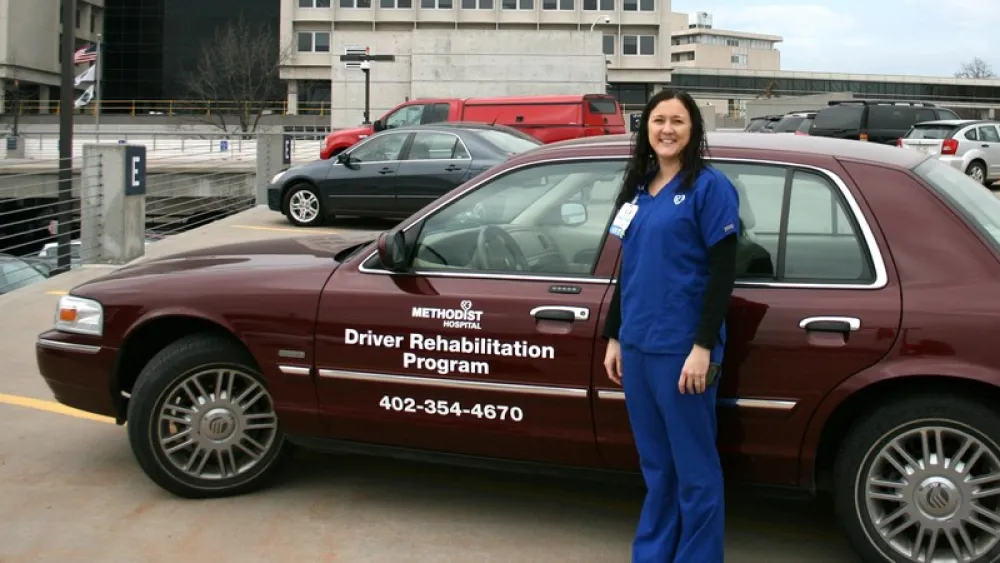




Today's Medicine
Making Safety Behind the Wheel #1


Since 2011, Kelina Moore, has held a very important seat at Methodist Hospital.
The passenger seat.
Moore, a Certified Driver Rehabilitation Specialist, has been helping hundreds of drivers feel safer behind the wheel through the Methodist Driver Rehabilitation Program.
What is Driver Rehabilitation?
“Sometimes it’s a decision to either seek help or perhaps lose their license,” said Moore, OTD, OTR/L, CDRS. “For others, it’s simply making sure that they are safe and can continue to drive as they age or after recovering from an illness or injury.”
The Methodist Driver Rehabilitation Program offers specialized driver training and assessment to help people of all ages and abilities drive as long as they are able. Some participants are long-time drivers who have had changes in their health or abilities. Others are new, younger drivers who may have restrictions due to injury or physical ability.
“Some come just to double-check their driving and make sure they are safe,” said Moore, “or they may come to relax their family members and ensure them they can continue driving safely.”
The program has been so successful, it is also reaching out to parents of new drivers who need one on one driver training and new drivers who need to learn to drive using hand controls versus the regular foot pedals. The students all vary but the most common diagnoses seen are: ADHD, anxiety, autism, cerebral palsy and spina bifida.
Evaluation for any reason
Drivers may choose to have an evaluation for a variety of health problems or concerns:
- Aging
- Anxiety
- Arthritis
- Heart disease
- Cognitive impairment
- Developmental disorders
- Limb amputation
- Other physical or orthopedic impairment
- Stroke or other neurological disorders
- Vision impairment
The program not only offers driver evaluation, its therapists can make recommendations on vehicle modifications that will help keep people in the driver’s seat.
“We can teach people to drive using just their hands or we have mirrors we can add if someone has limited range of motion in their neck,” said Moore. “Also, for people who have a hard time turning the steering wheel, we can add what’s called reduced effort steering. It’s a regular-looking steering wheel but it uses less motion and allows the steering wheel to turn much easier.”
Taking it step-by-step
The comprehensive driving program comes in four parts:
- Clinical Evaluation
Physical, cognitive, perceptual and visual abilities are assessed. - Behind-the-Wheel Evaluation
Ability to safely operate a vehicle in a variety of traffic situations is assessed. - Recommendation
Recommendations are made on the day of the evaluation. Those recommendations may include additional equipment for your vehicle to help you drive more safely. If it is determined a return to driving isn’t safe, staff members will provide information about transportation options and resources. - Training
If additional equipment such as mirrors or hand controls are installed in your vehicle by a third party vendor, additional training is provided.
“Our two training vehicles have all the different modifications we can either install or uninstall,” said Moore. “We have both a car and a ramp van, so we work on getting drivers comfortable behind the wheel in what they are used to driving.”
Success thanks to expert training
And it’s because of those training opportunities – and the unique expertise offered by the program – that it has become so successful. More than 120 drivers received evaluation last year alone. Moore, who heads up the Methodist Driver Rehabilitation Program, is the only Certified Drivers Rehabilitation Specialist in Omaha. The program is certified by the Nebraska Department of Motor Vehicles and its therapists are members of the Association of Driving Education for the Disabled (ADED).
But you don’t need to be disabled or recovering from an illness to ask for an evaluation. The recommendation can come from a referring physician, a family member or friend, or you can even ask for evaluation yourself.
“Driving is such a big part of independence,” said Moore. “Many people are willing to do what it takes to make sure they are safe on the road and retain their license if they are able. If that means adding a mirror here or there or adding a spinner knob to the steering wheel, then so be it.”
Program with a purpose
For Moore, the program is a passion. Her goal is to make the roads safer for all drivers, and to help families feel more comfortable with their loved ones on the road. There’s no greater satisfaction than giving a driver the green light.
“It’s my goal to keep people behind the wheel as long as it is safe.”
To learn more about the Methodist Driver Rehabilitation Program, call 402-354-4670 or visit www.bestcare.org/driverrehab.

